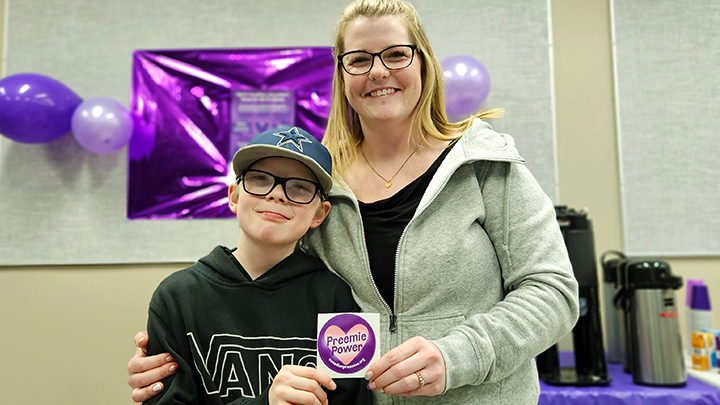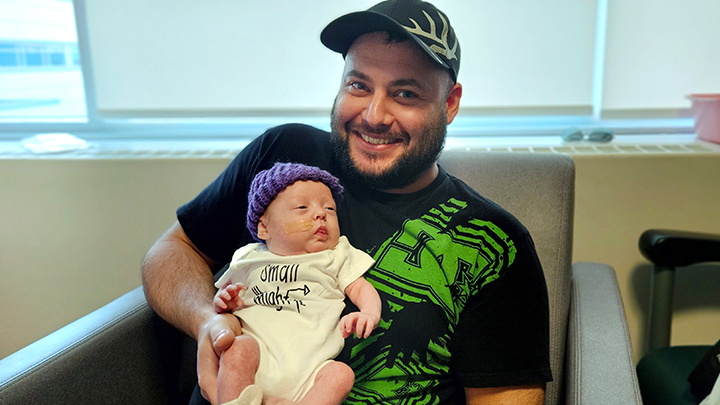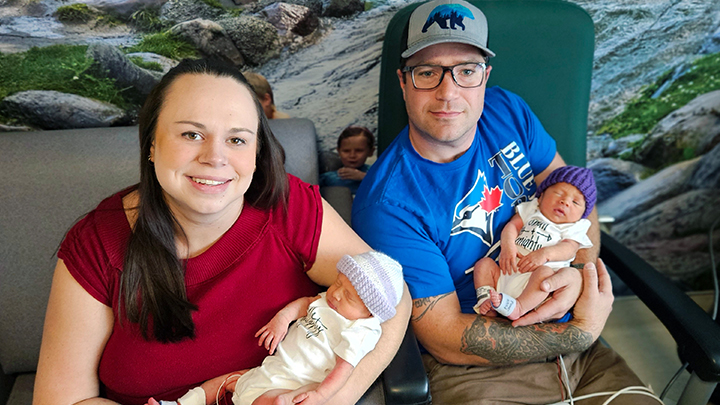
December 9, 2024

Kristi Johnston and son Gunnar, 11, pose at Red Deer Regional Hospital Centre for World Prematurity Day. Johnston says she was inspired by wonderful staff and the need for peer support in her decision. Photo by Tracy Kennedy.

Andrew Fraser and son Philip, of Blackfalds, want more people to know just how common premature birth is, with one in 10 babies born before 37 weeks. Photo by Tracy Kennedy.

Amy Rodtka and Matt Phillips, of Rocky Mountain House, hold their preemie twins Cassian and Tillie. They say it’s quite the experience that your babies have to stay in hospital and don’t get to come home with you each night. They also say the Ronald McDonald House has been a huge help so they don’t have to drive back and forth every day. Photo by Tracy Kennedy.
Story & photos by Tracy Kennedy
RED DEER — Parents learning to care for their premature baby in the Neonatal Intensive Care Unit (NICU) liken the experience to an amusement park ride, with moments of high thrills and laughter coupled with feelings of deep fear.
Parents who’ve spent time in the neonatal intensive care unit (NICU) came together recently to share the ride on World Prematurity Day, which was celebrated at Red Deer Regional Hospital Centre on Nov. 18.
“It’s a rollercoaster. It’s up and down and all around and upside-down, day in and day out,” says Red Deer mom Kristi Johnston of her 35-day stay in the NICU in 2013 with her son, Gunnar.
Now 11, Gunnar is known among the nurses of the unit, as he regularly returns to visit on this special day, celebrated annually to raise awareness of pre-term birth and its impacts on families. Preterm birth (babies born at less than 37 weeks gestation) is a leading cause of death among children under five, and the number one cause of childhood disability.
Though he’s now a healthy pre-teen, Gunnar’s preterm birth was a learning curve for Johnston. When she delivered him at 4 lbs. 15 oz and just 32 weeks old, Johnston says she was worried about his breathing and feeding — and experienced guilt.
“During the day is one thing and leaving him at night is another. There is mom guilt, family guilt, dad guilt. All of the guilt all of the time. It didn’t matter where you were, you felt guilty for not being somewhere else,” she says.
“Your crib’s not made, your house is a mess. If you have other kids at home, you have that guilt of ‘I should be with them’ and they’re struggling because they don’t know what’s happening.”
Though she raves about the wonderful care she received, she didn’t put herself out there to express her feelings with healthcare staff. It was for that reason that she returned to join RDRHC’s Family Integrated Care (FiCare) Team as a volunteer peer mentor.
Nowadays, she has non-medical conversations at the bedside to discuss that guilt and other feelings that she felt as well, to let parents know there are supports available and to reassure them they are not alone.
NICU manager Amie Mays knows the experience has its share of highs and lows, which is part of the reason to celebrate the milestones and successes.
“You may not get your desired birth plan. You don’t plan to stay in a NICU for a couple of months. Just seeing an IV placed on your newborn baby can be very distressing,” says Mays.
With a dedicated team of physicians, neonatal nurse practitioner, nurses, respiratory therapists and staff in children’s rehabilitation services, Mays acknowledges the tiny babies can pull on heartstrings.
“But it’s very rewarding to see babies develop over the course of their stay, and then be able to see them go home."
Home is very much on the mind of first-time dad Andrew Fraser. His son, Philip, had grown enough they were preparing to head home within the next couple of days.
“I’m so ready. Don’t get me wrong, everyone has been really nice to us, they take really good care of the kid, but going home is going to be sweet.”
Fraser says if there’s anything he’d want families to know on World Prematurity Day it’s just how common preterm birth is, with one in 10 babies born premature around the world.
Also likening the ride to a rollercoaster, he says they were told in the beginning to prepare for the highs and lows.
“There are going to be good days and there are going to be bad days and sometimes they’re going to be the same day.
“There have been times where I’ve not been myself and you’ve just got to try and keep your head up,” says Fraser.
At the same time, he’s looking forward to more of the fun days and the firsts, especially when life gains some more normality back at home.
“First day we got to dress him — cool. First day we got to feed him — cool. And then there’s just some of the normal, mundane parent stuff — like the first time you get pooped on.”